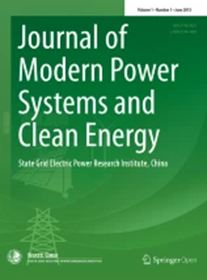Charging Pricing for Autonomous Mobility-on-Demand Fleets Based on Game Theory
IF 5.7
1区 工程技术
Q1 ENGINEERING, ELECTRICAL & ELECTRONIC
Journal of Modern Power Systems and Clean Energy
Pub Date : 2024-03-10
DOI:10.35833/MPCE.2024.000139
引用次数: 0
Abstract
Considering the enormous potential application of autonomous mobility-on-demand (AMoD) systems in future urban transportation, the charging behavior of AMoD fleets, as a key link connecting the power system and the transportation system, needs to be guided by a reasonable charging demand management method. This paper uses game theory to investigate charging pricing methods for the AMoD fleets. Firstly, an AMoD fleet scheduling model with appropriate scale and mathematical complexity is established to describe the spatio-temporal action patterns of the AMoD fleet. Subsequently, using Stackelberg game and Nash bargaining, two game frameworks, i. e., non-cooperative and cooperative, are designed for the charging station operator (CSO) and the AMoD fleet. Then, the interaction trends between the two entities and the mechanism of charging price formation are discussed, along with an analysis of the game implications for breaking the non-cooperative dilemma and moving towards cooperation. Finally, numerical experiments based on real-world city-scale data are provided to validate the designed game frameworks. The results show that the spatio-temporal distribution of charging prices can be captured and utilized by the AMoD fleet. The CSO can then use this action pattern to determine charging prices to optimize the profit. Based on this, negotiated bargaining improves the overall benefits for stakeholders in urban transportation.基于博弈论的自主出行按需车队收费定价
考虑到自主按需出行(AMoD)系统在未来城市交通中的巨大应用潜力,作为连接电力系统和交通系统的关键环节,AMoD车队的充电行为需要合理的充电需求管理方法来指导。本文运用博弈论研究了AMoD车队的收费定价方法。首先,建立具有适当规模和数学复杂度的AMoD机队调度模型,描述AMoD机队的时空行动模式;随后,利用Stackelberg博弈和纳什议价,设计了充电站运营商和AMoD车队的非合作和合作两种博弈框架。在此基础上,讨论了双方的互动趋势和收费价格形成机制,并分析了打破非合作困境、走向合作的博弈含义。最后,给出了基于真实城市规模数据的数值实验来验证所设计的游戏框架。结果表明,AMoD车队可以捕捉和利用收费价格的时空分布。然后,CSO可以使用这种行为模式来确定收费价格,以优化利润。在此基础上,协商议价提高了城市交通利益相关者的整体效益。
本文章由计算机程序翻译,如有差异,请以英文原文为准。
求助全文
约1分钟内获得全文
求助全文
来源期刊

Journal of Modern Power Systems and Clean Energy
ENGINEERING, ELECTRICAL & ELECTRONIC-
CiteScore
12.30
自引率
14.30%
发文量
97
审稿时长
13 weeks
期刊介绍:
Journal of Modern Power Systems and Clean Energy (MPCE), commencing from June, 2013, is a newly established, peer-reviewed and quarterly published journal in English. It is the first international power engineering journal originated in mainland China. MPCE publishes original papers, short letters and review articles in the field of modern power systems with focus on smart grid technology and renewable energy integration, etc.
 求助内容:
求助内容: 应助结果提醒方式:
应助结果提醒方式:


